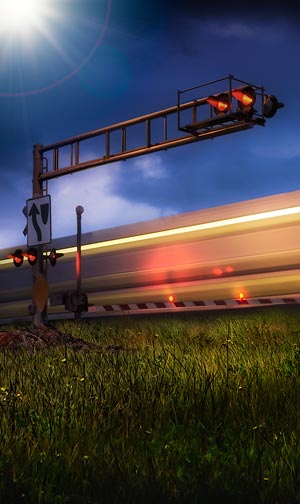Witnesses Step Forward To Challenge Mother’s Death Due To Trying To Beat Train
(Madison, Illinois – March 17, 2012)
What was originally billed as a closed case of a motorist attempting to beat an Amtrak train at the Union Pacific crossing of Bissell Street in the Illinois-side St, Louis, MO suburb of Madison, IL February 28 is now becoming a possible situation of UPRR signal workers having been working on the lights and gates at the crossing as additional witnesses surface.
Latasha D. Wilson, 29, of East St. Louis, IL and the mother of three young children died shortly after her red Pontiac Grand Prix was T-boned by a St. Louis-bound Amtrak train carrying 17 passengers at the intersection, which is confusing in itself due to the existence of two separate railroad crossings (UP and Norfolk Southern) of Bissell Avenue as well as the adjacent parallel of Illinois Highway 3 to the tracks of both railroads.
Originally, investigators were calling the tragedy a “beat the train” accident, even though the statements of an original eye-witness should have raised some red flags in regard to the crossing’s signalization having been operating properly.
Sean Bennett said he was sitting on a curb of Bissell Avenue around noon Feb. 28 when he saw the victim’s car “come around the corner and pass under the crossing arm before the arm came all the way down.”
In 35 mph territory, for the gates to not fully employ prior to the train reaching the crossing should be cause for concern for investigators. But obviously it wasn’t – that is, until at least two truck drivers came forward to offer The Belleville News-Democrat their own experiences at the same crossing only minutes before and as the fatal accident occurred.
A local trucker and eye-witness to the tragedy Dale David had called the News-Democrat to question the faulting of the young mother for the accident saying that he did not believe the victim even saw the train coming due the erratic behavior of the crossing gates.
The driver of an 18-wheeler, David said he was sitting in traffic on Route 3, parallel to the victim, who was in the turn lane for Bissell Ave. He told Madison Police the same account of the accident, saying the lights were not on and the gates were not down when the victim made her turn onto Bissell and the UPRR tracks.
“She got about even with or just past them (the railroad crossing signals). That’s when the arms came down to stop the traffic,” said David, emphasizing “That gal didn’t run that light!”
Shortly thereafter, another truck driver who uses the crossing regularly offered an even more detailed version of his experience just five minutes before Ms. Wilson’s car collided with the Amtrak train.
“I was there five minutes before she tried to cross the tracks,” recounted Charles Heard, adding that “They brought the gates down on that girl. When they bring the gates down and the lights are on, the gates cover the whole road. The gates are down and the lights are on well before a train gets to that intersection. And traffic is stopped,” he explained to News-Democrat Writer Carolyn P. Smith.
“I was headed south on Illinois Route 3,” continued Heard of his own experience minutes before the tragic crash. “I made a left turn on Bissell. There was a Grand Am behind me.”
Referring to the railroad signal control box, Heard said “There were people in that box working. They brought the gates down and turned the lights on as we were on the tracks. I was on the phone with my wife and I told her that they brought the gates down on me,” he continued.
Over the phone, Heard’s wife asked if her husband was on the tracks, to which Heard replied “They took the gates up before I hit them.”
“Five minutes later, I heard about the accident,” said the truck driver.
In 1999, a Union Pacific signal maintainer had been working on the crossing signals at U.S. Route 36 and UPRR tracks in McLean, IL – the same route followed by the train that killed Ms. Wilson – and failed to remove a jumper wire (which would prevent the lights and gates from activating as a train approached the crossing) from the crossing’s circuitry after he finished work and headed for home. Two Western Illinois University students headed back to school in Macomb, IL, were killed when an Amtrak train for which they had no warning struck their car at 74 mph. Meanwhile, the maintainer, hearing of the accident, returned to the scene and attempted to remove the evidence – the jumper wire — from the railroad signal control box.
Meanwhile, state, local and federal agencies investigating the case stonewalled The Belleville News-Democrat reporter, with the Madison Police Dept., the Illinois State Police and the National Transportation Safety Board leaving Ms. Smith’s calls for comment unanswered.
Wilson was the single mother of three boys, Daunte, 11, Derion, 7, and Omar, 3, and was pursuing education to become a registered nurse through South West Illinois College while she worked full-time at the Caseyville Nursing and Rehabilitation Center in Collinsville, IL.
“There wasn’t anything she wouldn’t do for her boys,” said Wilson’s long-time friend Lavia Haynes, who added that she doubted Wilson was the type of person who would ever have attempted to beat a train.


